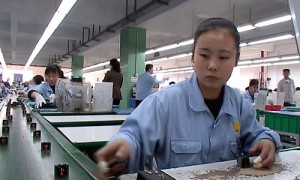Most striking workers have returned to work at the Nokia factory in the southern Chinese city of Dongguan after their recent industrial action, but experts have warned that the strike should serve as a lesson for transnational mergers and acquisitions.
Up to 1,000 employees went on strike since November 19, out of concern that their wages will be cut as Nokia sells its mobile business to US software giant Microsoft.
The strike happened on the same day the Finnish telecom firm announced that its shareholders had approved the 5.4-billion-euro ($7.2 billion) sale, with the transfer set to take place in early 2014.
About 32,000 employees of Nokia will join Microsoft, including staff from the Dongguan factory, founded in 1995 as one of Nokia’s major production bases of mobile devices. The factory has a staff of 4,900.
The workers were worried that they would be forced to sign contracts with the new employer under worse terms, namely lower salaries and fewer days of paid leave.
They demanded that their current contracts with Nokia should be terminated ahead of the transfer, and the company should pay their compensation in full according to related laws and regulations.
The workers also wished to sign new employment contracts with Microsoft under equal or better terms.
An executive of the factory told Xinhua that the workers gradually resumed their duties from Sunday after the two sides reached a compromise, with help from the local authorities.
“Microsoft has promised that the workers’ salaries and benefits will stay the same as their current standards within 12 months after the acquisition,” according to an internal mail.
Gao Xiang, head of communications of Nokia China, said its Dongguan factory will also give a 1,000-yuan bonus (about $164) to each worker who did not join the strike.
Those who refuse to go back to work will be fired, according to an internal mail. A worker surnamed Liang said more than 200 of his colleagues had already been sacked.
Similar strikes have also happened in other Chinese factories in other cases of transnational mergers, such as Western Digital’s purchase of Hitachi Global Storage Technologies and Indian tire maker Apollo’s attempted acquisition of US Cooper Tire.
According to experts, multinationals must learn to take the interests of Chinese factories and workers into account, as their support may have a great impact on mergers and acquisitions.
Wang Jiangsong, a professor with the China Institute of Industrial Relations, said the sporadic strikes showed the awakening of Chinese workers’ awareness on rights.
“China’s first generation of migrant workers just want to earn some money and are less rights-conscious,” Wang said. “But the new generation have a stronger rights consciousness. They will resist fiercely should their rights be violated.”
Source: ECNS

